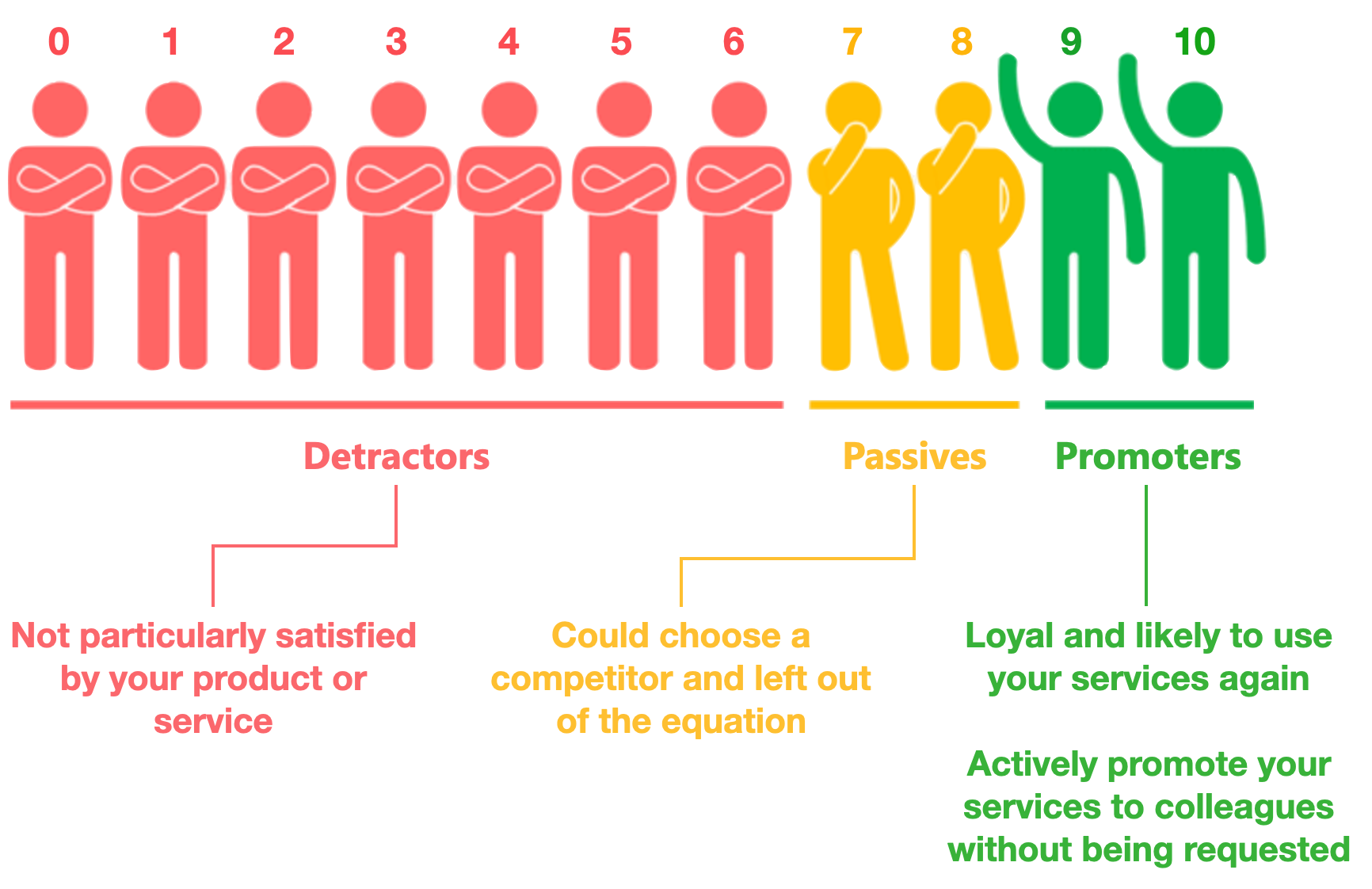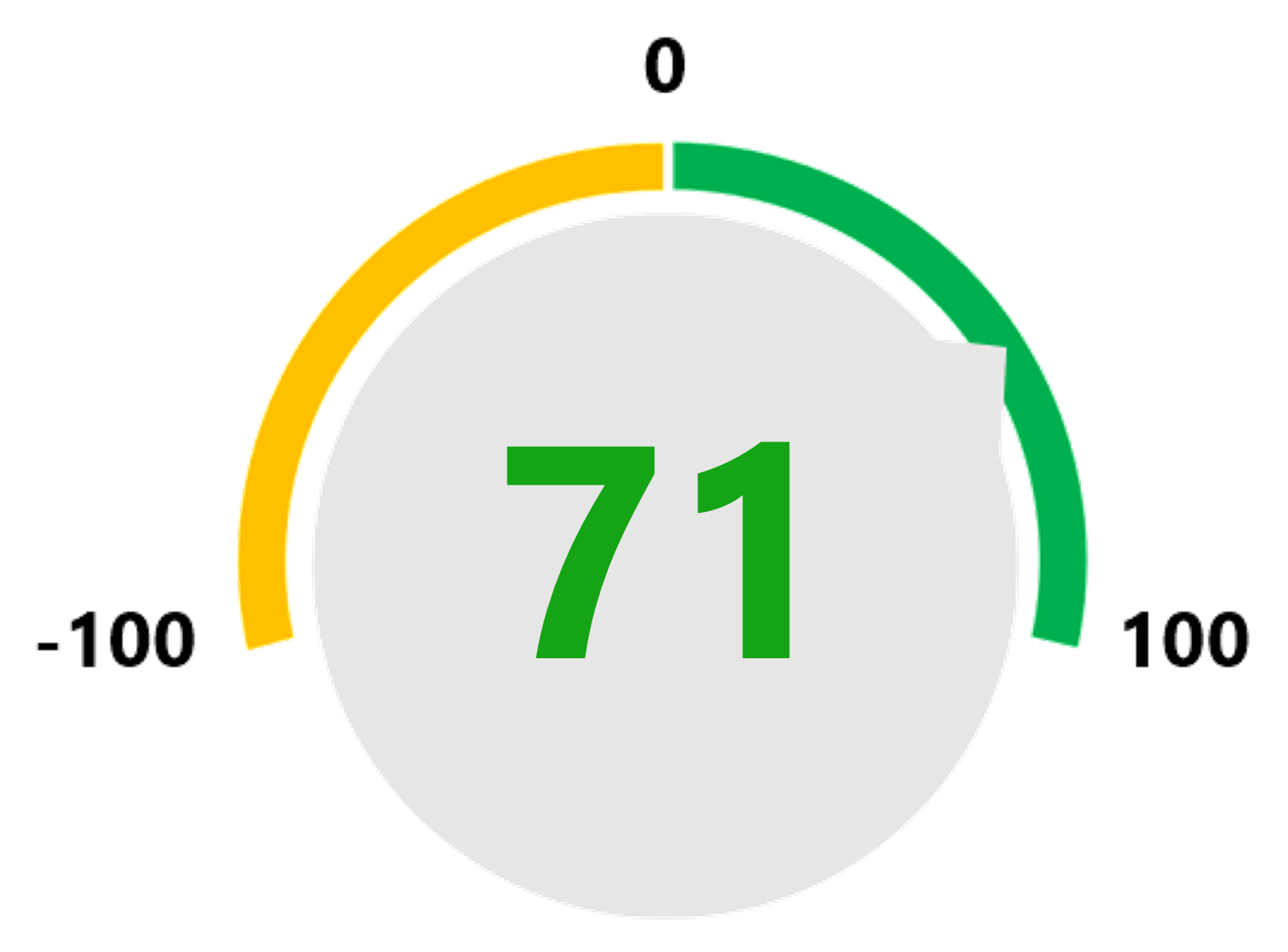What is a Net Promoter Score (NPS)?
The Net Promoter Score (NPS) is the percentage of customers rating their likelihood to recommend a company, a product, or a service to a friend or colleague. This score is an index that ranges from -100 to 100, and it’s used to measure satisfaction with a company’s product or service and customer loyalty.
Why should Net Promoter Score (NPS) matter to customers and clients?
Simply put, NPS matters because it demonstrates a company’s quality of service. A high NPS is a good sign for new customers looking to do business with a specific company. If organizations have a high score, it means customers are happy with the service they got from a company. It also indicates that they have a track record of meeting expectations. Not all companies will publicize their NPS, but when they do have a good score, it shows that they’re delivering what customers or clients want from them.
How is Net Promoter Score (NPS) calculated?
This question is most commonly shown to customers in the form of a survey. However, companies may also send it out via email, social media poll, or as a pop-up notification. When a customer answers the question, they’re placed into one of three categories. Those categories are:
– Detractors: numbers 0-6
– Passives: numbers 7-8
– Promoters: numbers 9-10
What is a good Net Promoter Score (NPS) score for a services company?
Technically, any score above 0 is good. That’s because any score above 0 means a business has more loyal customers than disloyal customers.
A good score may look slightly different from industry to industry. However, according to global benchmark data from SurveyMonkey which accounts for the NPS of more than 150,000 organizations, the average score is 32. Anything above a 20 is favorable and any score over 50 is considered excellent. When you reach a threshold of 70 as your NPS, you are generating a high volume of positive feedback in organic referrals and, statistically, this rings true for us here at Unosquare as over 90% of our client base has been referred to us from prior customers.
Why look at the Net Promoter Score (NPS) when choosing a company for agile staffing or digital transformation?
The method for calculation shows that the higher the NPS a company has, the more promoters they have. This means they have a great product or service and have loyal customers.
When you’re considering working with an outsourcing software development company, it’s hard to feel confident that you’re making the right choice. Since so many vendors are competing for your attention, selecting the right one can often be a struggle. That’s why it’s so important to look for indicators that a company can deliver on what you’re looking for.
An organization’s Net Promoter Score is one of those indicators that can help you make a decision. While this score is typically seen as important to customer service leaders, a company’s score can also provide a lot of information to customers themselves. As a service provider we felt it was important to establish a benchmark for the quality of our services directly from our customers.
Unosquare gathered our NPS feedback over the course of 2019 and into the pandemic of 2020, reaching out to client stakeholders that were actively involved in using our services. We asked over 120 individuals to provide us feedback at all levels of engagement, from C-Suite through software development professionals.
At Unosquare, we have a Net Promoter Score of 71 and we believe that this score is important. Not just for existing customers and clients, but for potential clients as well. In this post, we’ll explain exactly what a Net Promoter Score is, why it matters and how companies calculate it.
What is a Net Promoter Score (NPS)?
The Net Promoter Score (NPS) is the percentage of customers rating their likelihood to recommend a company, a product, or a service to a friend or colleague. This score is an index that ranges from -100 to 100, and it’s used to measure satisfaction with a company’s product or service and customer loyalty.
Why should NPS matter to customers and clients?
Simply put, NPS matters because it demonstrates a company’s quality of service. A high NPS is a good sign for new customers looking to do business with a specific company. If organizations have a high score, it means customers are happy with the service they got from a company.
It also indicates that they have a track record of meeting expectations. Not all companies will publicize their NPS, but when they do have a good score, it shows that they’re delivering what customers or clients want from them.
How is NPS calculated?
While NPS may sound complicated, companies can follow a simple process to determine their score. NPS is calculated by asking one specific question:
“On a scale of 0 to 10, how likely is it that you would recommend our organization to a friend or colleague?”
This question is most commonly shown to customers in the form of a survey. However, companies may also send it out via email, social media poll, or as a pop-up notification. When a customer answers the question, they’re placed into one of three categories. Those categories are:
Detractors: numbers 0-6
Passives: numbers 7-8
Promoters: numbers 9-10
A detractor is defined as a customer who didn’t like a product or service and someone that’s unlikely to be loyal to the company. A passive customer is someone who is neutral. They’re unlikely to have a strong feeling about the brand or service. Lastly, a promoter is a loyal customer. They’re the ones that are most likely to refer the product or service to others.
Ideally, companies would have a large number of promoters and only a small number of detractors. If a company has a lot of detractors, it will result in a lower score. This would also show that they have room for improvement when looking at the service that they offer.
Companies then use the number of customers in these categories to calculate their NPS. The formula is (Number of Promoters — Number of Detractors) / (Number of Respondents) x 100

What is a good NPS score?
Now that you know how companies find their NPS, you might be wondering: what is a good score? Technically, any score above 0 is good. That’s because any score above 0 means a business has more loyal customers than disloyal customers.
A good score may look slightly different from industry to industry. However, according to global benchmark data from SurveyMonkey which accounts for the NPS of more than 150,000 organizations, the average score is 32. Anything above a 20 is favorable and any score over 50 is considered excellent. When you reach a threshold of 70 as your NPS, you are generating a high volume of positive feedback in organic referrals and, statistically, this rings true for us here at Unosquare as over 90% of our client base has been referred to us from prior customers.

It’s also true that as companies gain experience working with their customers or clients, they should be aiming to increase their NPS. For example, as our company has matured, we’ve refined our processes so that they reflect our understanding of our industries of focus. Unparalleled transparency paired with top-tier talent plays a big role in our high NPS, which is more than double the average score.
Why look at the NPS score when choosing a company for agile staffing or digital transformation?
The method for calculation shows that the higher the NPS a company has, the more promoters they have. This means they have a great product or service and have loyal customers. Here at Unosquare, we have a good track record of meeting client’s needs, we’re good at communicating with customers, and we have industry expertise. All of these things work together to allow us to uphold our world class NPS score of 71.
What our customers think about the service we provide matters to us. We also believe that any company or partner you’re considering should feel the same way. Before you select a vendor, consider the information you have about their customer satisfaction. If a company has done work on projects like yours in the past and customers have had a good experience, you’re likely to have a similar outcome.
Consider taking a look at our reviews on Clutch. This candid customer feedback on our performance in the contemporary software development market. Our clients’ feedback reinforces the NPS score that we have earned and provides more details on our service approach and the value additions to our delivery model that separate us from our competition.
Candidly speaking, there are a lot of companies that do what we do. Outsourcing software development continues to increase in popularity, especially that the entire world been forced by the COVID pandemic to experiment with remote, distributed teams. We do our jobs well and our customers are willing to vouch for that, evidenced by our NPS feedback and Clutch reviews..
Are you ready to choose a partner for your project?
If you want to start outsourcing or working on a digital transformation initiative, we can help. Unosquare helps organizations operationally augment technology teams, design and build user experience-focused web applications and products, and drive client initiatives in digital transformation in our industries of focus. We understand the need for transparency, efficiency, and, more importantly, delivery.
We work with the best talent in the world. That way, you can outsource with confidence and bring in the talent you need to get your project done. Let us provide expertise for your teams in a way that is fast, transparent, and efficient. To find out more about what Unosquare can do for your organization, check out our blog.



